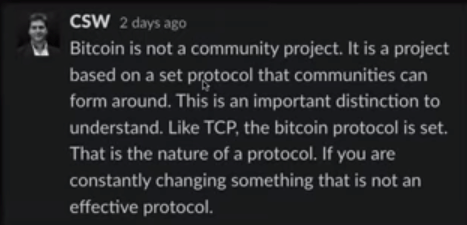Bitcoin inventor Dr. Craig Wright recently spoke with George Siosi Samuels on the Bitcoin Will Come podcast. You can watch the interview directly below, or you can read a written summary of the key points if you prefer.
On Dr. Wright’s recent legal victory
In late 2021, Dr. Wright won a landmark legal victory when he was declared the sole inventor of Bitcoin. The plaintiff, Ira Kleiman, brother of Dr. Wright’s late friend David Kleiman, failed to produce convincing evidence that his brother had co-invented Bitcoin.
Samuels jumps right in at the deep end and asks Dr. Wright how he felt when he won.
Dr. Wright begins by answering a different question, speaking about his current annoyance at how developers are overcomplicating things and focusing on problems that don’t need to be fixed. Samuels asks him if this is a common trait in developers, and he answers that it is. He reflects on when he created Bitcoin and how he used diagrams, waterfall charts, and other means to simplify things before coding it or writing the white paper. He emphasizes that Bitcoin is simple and that most developers either misinterpret it or overcomplicate it.
Samuels asks Dr. Wright if there’s anything he believes he could have done differently to avoid the court cases that have taken up so much time and resources in recent years. He answers that he believes it would have played out the same way due to the anarchists that came on board early and hijacked Bitcoin.
On COPA vs Wright and what lies ahead
Right off the bat, Dr. Wright reminds Samuels that it’s premature to say the legal cases are over. COPA vs. Wright lies ahead. He jokes that he has managed to unite Silicon Valley rivals like Jack Dorsey and Mark Zuckerberg in a common purpose against him.
Samuels asks Dr. Wright to elaborate on the COPA case for those who might not know. He summarizes that he is trying to disrupt the business model they make money from, and he wants to create a world where individuals own their own data. He doesn’t believe the Silicon Valley giants will be able to adapt and implement micropayments well.
Why do these companies have to worry about Bitcoin? Dr. Wright explains that the Bitcoin protocol facilitates direct connectivity and disrupts the “closed garden” models these companies profit from. He points out the hypocrisy of companies like Meta joining COPA under the guise of open source development when they themselves sold many patents related to digital currencies before joining the fight against Bitcoin.
Changing the ‘free’ mindset of internet users and correcting the concept of decentralization
Samuels asks Dr. Wright for his thoughts on how to change the behavior of internet users who are used to the ‘free’ model of the ad-based web.
Dr. Wright objects to the notion that the existing models are free at all. He points out that users are paying with their data, and the large companies that have cornered the web are raking in vast profits. “We have three or four companies that open all the data globally,” he says, pointing out that these companies are vulnerable to hacks and breaches from rogue actors like Iran and North Korea.
Continuing on from this, Dr. Wright emphasizes that the concept of decentralization is not about everyone being able to run a node but is about a robust and secure network. On such a network, it wouldn’t be possible for large companies to buy, store, and sell data, and so the breaches that lead to data leaks would also cease to be a problem. This is a very different definition from how most define the word.
On conscious capitalism
Samuels asks Dr. Wright to elaborate on a concept he heard him mention after the Kleiman vs. Wright trial. He asks him to define conscious capitalism and explain what it means.
Dr. Wright begins by mentioning that Adam Smith, one of history’s renowned proponents of capitalism and author of The Wealth of Nations, also had another book called The Theory of Moral Sentiments. He points out that the extractive ‘how much money can I get out of people’ mindset is wrong and is not truly reflective of capitalism as he sees it. Dr. Wright condemns making money for the sake of money and points out that the founders of an enterprise are free to determine value as they see fit. For example, a non-profit hospital could define success by the number of successful operations it conducts.
Dr. Wright points out that the extractive model of taking more than the value produced is rampant in the ‘crypto’ industry we know today. He calls it non-creative gambling and says it is not capitalism at all.
On the short attention span of modern internet users and its causes
Samuels rightly points out that so few people understand capitalism as Dr. Wright defines it because few do historical research. He wonders why modern internet users don’t look back very far and have such a short attention span.
Dr. Wright points out that philosophers like Aldous Huxley predicted that we would be flooded with information to the extent that we wouldn’t be able to focus on anything. Writers like Orwell predicted the modern state of affairs through their fictional worlds. “As a consequence, you’d drown in information,” he says. He believes we are entering this type of world.
On communities and the ‘Bitcoin community’

Dr. Wright has repeatedly said that Bitcoin is not and never was a community project. Samuels asks him for his thoughts on communities in general.
“Bitcoin is not a community,” Dr. Wright emphasizes once again. He points out that it’s something to build on and use. Saying you’re part of the Bitcoin community is as absurd as saying you’re part of the electricity community.
Where does the notion of a Bitcoin community come from? Dr. Wright believes that many individuals concerned have little else going on in their lives. He lays part of the blame at the feet of companies like Facebook and Google and the move away from foundational subjects like philosophy, English literature, and other subjects with depth. This has led to one-sided thinking and the inability to see things from multiple perspectives and engage in nuanced thought.
The mistaken notion of Bitcoin as a cryptocurrency
Dr. Wright has repeatedly said that Bitcoin is not a cryptocurrency. He again emphasizes it in this interview. He says that eGold, Liberty Reserve, etc. were cryptocurrencies, but that Bitcoin is not. Whereas these systems attempted to use encryption to obfuscate information, Bitcoin does the exact opposite. He says that much of the misunderstanding about this topic comes from early Bitcoin websites and blog posts. He handed over control of the main site in 2010 and didn’t pay much attention to it, not noticing that it referred to Bitcoin as a peer-to-peer cryptocurrency.
On Non-Fungible Tokens (NFTs)
Dr. Wright has given his thoughts on NFTs before. To say that he’s not a fan of Bored Apes would be an understatement. Samuels delves into this topic, asking him for his thoughts on it.
Dr. Wright says that most NFTs are simply money-laundering vehicles. He also points out that nChain has patents on NFTs that date back years. “The difference is that I didn’t envision high-value crap art. I envisioned movie tickets, train tickets, digital tokens for accessing computers, etc,” he said.
Setting aside the high-value digital art that characterizes the current NFT craze, Dr. Wright does believe that they have potential. He gives the example of how if every British train ticket minted an NFT at one cent per ticket, it would add up to well over £18 million (around $23.5 million) per year.
Watch: CoinGeek New York panel, BSV vs. Other Blockchains: Differences that Matter for Developers & Businesses
New to blockchain? Check out CoinGeek’s Blockchain for Beginners section, the ultimate resource guide to learn more about blockchain technology.











